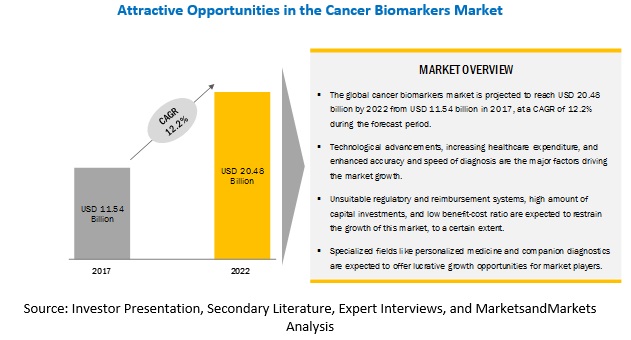
According to research report the global cancer biomarkers market is projected to reach USD 20.48 billion by 2022 from USD 11.53 billion in 2017, at a CAGR of 12.2%. Cancer biomarkers are substances or processes that are indicative of the presence of cancers in the human body. Biomarkers may be produced by the cancer tissue itself or by other cells in the body in response to cancer. They can be found in the blood, stool, urine, tumor tissue, or other tissues or bodily fluids. They enhance cancer detection and facilitate high-speed noninvasive diagnosis using genomics and proteomics.
Download PDF Brochure: https://www.marketsandmarkets.com/pdfdownloadNew.asp?id=202
North America dominated the market in 2016
North America (comprising the US and Canada) is accounted for the largest share of the global cancer biomarkers market in 2017, followed by Europe. The large share of this geographic segment is mainly attributed to the increasing government support for discovery and development of biomarkers, increasing demand for personalized medicine, adoption of advanced omics technologies for biomarker discovery, and rising use of biomarkers in drug discovery and development by pharmaceutical companies in that region.
The major players in the cancer biomarkers profiling technology market are Abbott (US), Affymetrix (US), Roche (Switzerland), Illumina (US), QIAGEN (Netherlands), Agilent (US), Thermo Fisher (US), Merck (US), Becton Dickinson (US), and Hologic (US).
Get Report Sample: https://www.marketsandmarkets.com/requestsampleNew.asp?id=202
Polymerase Chain Reaction (PCR) is a laboratory technique used to make multiple copies of a segment of DNA. It is very precise and can be used to amplify or copy a specific DNA target from a mixture of DNA molecules. It enables the detection of minimal residual disease and also detects cancer with genetic abnormalities. PCR can help define subgroups of patients that are suitable candidates for anti-cancer therapies. PCR-based diagnostic kits are used to detect several biomarkers such as B-Raf, Epidermal Growth Factor Receptor (EGFR), and Kristen Rat Sarcoma (KRAS), among others, to access specific mutations in clinical trial laboratories. They aid in selecting the right candidates in clinical trials for treatment with tailored drugs.
Based on cancer type, the breast cancer segment accounted for the largest share of the market in 2016
The cancer biomarkers market on the basis of cancer type is classified into breast, lung, colorectal, prostate, melanoma, leukemia, thyroid, bladder, non-hodgkin’s lymphoma, kidney, and other cancers, such as cervical, multiple myeloma, and CNS, gastric, liver, pancreatic, oral cavity and pharynx, stomach, and ovarian cancers.
Next generation sequencing (NGS)
Sequencing is the process of determining the precise order of
nucleotides in a DNA/RNA sample. The advent of rapid sequencing methods
has greatly enhanced biological and medical research and the discovery
of biomarkers. Next-generation Sequencing (NGS) is one of the most
significant developments in genomics technologies with regards to cancer
biomarker discovery, diagnostics, and prognostics. It has advanced the
biomarker discovery process by accelerating the timeline of sequencing
as R&D efforts are no longer bound to a single gene or small gene
panels. Through massively parallel sequencing, this technology brings
about faster identification of genetic diseases in specific populations
or tissue types
Polymerase chain reaction (PCR)